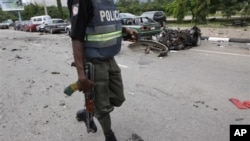Militants from Nigeria's oil-rich Niger Delta set off several small bombs in the capital during ceremonies marking the 50th anniversary of independence. Police in Nigeria say at least eight people have been killed and several others injured.
Two car bombs went off in Abuja and there was also a smaller explosion nearer the parade grounds -- all claimed by the Movement for the Emancipation of the Niger Delta which issued a statement saying there is nothing worth celebrating after 50 years of failure.
The explosions did not disrupt the independence ceremonies where President Goodluck Jonathan said that on this day in 1960 the new citizens of a new country were full of hopes.
"Nigerians were filled with expectations as the Union Jack was lowered and the green-white-green flag was raised in its place," said President Jonathan. "A new country was born. A new journey had started on a route never taken before. The future was pregnant with promise."
In a written statement, the president's office said the bombings are a "low, dirty and wicked act of desperation by criminals and murderers." It said the president grieves with families who have lost loved ones and wants those behind the attacks to know that they will be found and "will pay dearly for this heinous crime."
Over the last 50 years, that promise has not always been delivered on as Nigeria suffered through a civil war and long years of military rule. Today, President Jonathan says many Nigerians believe the dreams and expectations of independence have not been fulfilled.
"Not only do people despair over the slow pace of progress, some have in fact given up on the country," added Jonathan. "Some believe that if the colonial masters had stayed longer, Nigeria may have been better for it. Our troubles and our failures are well-cataloged."
President Jonathan says despite serious challenges, Nigerians have cause to celebrate their nationhood and look forward to a brighter future.
Mr. Jonathan wants to be a part of that future by running for president next year. But his campaign illustrates one of Nigeria's greatest weaknesses - regional rivalries. An informal political agreement says the next Nigerian president should be from the north to finish out what would have been the second term of the late President Umaru Musa Yar'Adua instead of continuing on with Mr. Jonathan, who is from the south.
Mistrust between the mainly-Muslim north and predominantly-Christian south was exploited by British colonial rulers who entrenched separate regional councils in the 1947 constitution, a divide-and-rule tactic denounced at the time by the man who would become Nigeria's first president, Nnamdi Azikiwe.
"As delegates of the National Council of Nigeria and the Cameroons, chosen by our people in order to demand for a more democratic constitution, to modify foreign laws affecting our land, minerals, and chiefs," explained Azikiwe. "And to request the British government to grant us more political responsibility to enable us to take an active part in the management of our affairs within the framework of the British Empire."
Yusuff Maitama Sule was a minister in that first government.
"One would have thought that the crisis of uniting this country should have started when they were here," added Sule. "But perhaps because of the policy which they had been identified with of divide-and-rule, they kept the different parts of the country separate for quite some time. And left the country like this. This made it very difficult for the Nigerians leaders after independent to bring about national unity."
Fifty years later, newspaper editor John Ege says the golden jubilee is worth celebrating, if only because Nigeria has survived so much.
"Nigeria at 50, that is an achievement. It is worth celebrating that we lived up to 50 years. It is not easy," noted Ege. "There have been significant improvements in the life of Nigeria. We have the Internet. We have so many things in Nigeria apart from the power failure and the infrastructural decay. But there is hope."
But computer saleswoman Helen Arerota is not so sure.
"Our country Nigeria at 50, we are still struggling," said Areota. "Even crawling is an understatement. It is a child that is still sitting. Military or non-military, the leaders in their state of mind they are corrupt."
Nobel laureate Wole Soyinka says Nigeria as a nation is still a work in progress.
"You can unveil the flag as much as you want, you can recite the national pledge as long as you want you can sing that banal, tawdry national anthem as loudly as you like, that project is still in the making," said Soyinka.
Soyinka says next year's vote is a chance to regain ground lost when the military annulled Nigeria's 1993 election.
"If Nigerians still go to this election hammer and tongs with that mentality of the most ruthless killer take all - not just winner take all, but killer take all - then of course this election is going to be a disaster," noted Soyinka. "It's possible; a free and fair election can only come about if Nigerians recover that sense of self worth that made them act in a disciplined and truthful manner towards one another in the election of 1993."
Then-military-ruler Ibrahim Babangida annulled that 1993 vote, which is widely seen as Nigeria's fairest ever. The retired general is now a candidate in next year's election.




